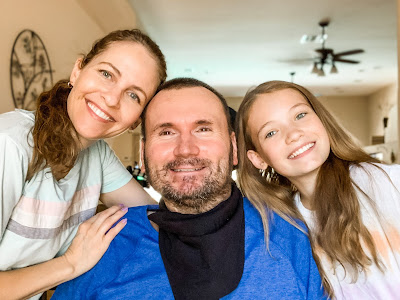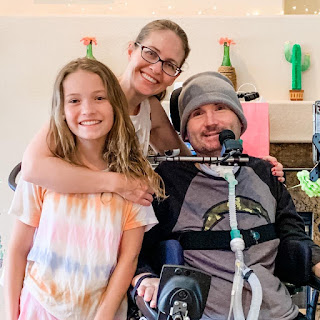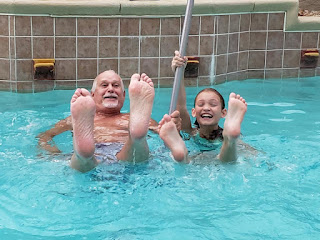In Nevada, it is a felony to practice medicine without a license. It is illegal and punishable by fines and/or imprisonment to perform unlicensed nursing in our state.
And yet, this is what I do every day.
This issue was recently brought to my attention through a Facebook post written by a woman who I don't know personally, but who I respect deeply for her unyielding advocacy for her medically complex daughter.
Dawn Oates' voice resonates loudly for all families who are forced to provide skilled nursing care for their loved ones, and who do so without pay, without recognition, and to the financial benefit of government programs. Her point in writing her Facebook post (at 1:30am no less - a time acknowledged by many family caregivers to be the only time of day such productivity is available) was to advocate for family caregivers to be included in Phase One for Covid vaccinations. But she also discusses a variety of other issues that directly affect the daily lives of family caregivers and the ones they provide care for.
A huge issue for Dawn's family is an inadequate supply of qualified nurses to provide care for the hours her daughter qualifies for (an issue that existed before Covid, but is now exacerbated by it).
The issue for my family is different, but related.
My husband Jeff is a C4, ventilator-dependent quadriplegic who requires 24/7 care. He can't move his arms. He can't breathe on his own. He needs assistance with every aspect of life. And yet he doesn't qualify for nursing care.
Most people (those who are not family caregivers) are so surprised to learn this. How in the world can someone with such a severe disability not qualify for any nursing care? It's because as an adult, the disability is not the first factor in determining whether someone qualifies for care. It's all about work history. Jeff worked for 20 years before he was injured. And because of that, he qualifies to receive Social Security Disability Insurance benefits. And the monthly amount he receives is just over the threshold for what is allowable by Medicaid, the only government program that provides nursing care. In essence, my husband makes "too much money" to qualify for nursing care - though of course that statement is ridiculous because his income in no where near adequate to survive on AND pay for necessary care, equipment, and supplies required for his medically complex situation.
Enter the family caregiver.
The unpaid, untrained loved one who is forced to provide essential, highly skilled, life-saving duties. Day in day out, we slip right through a legal loophole and perform care that is otherwise denied to our loved ones. Care we would be imprisoned for is we tried to provide it to anyone else besides our family members.
Yes, my husband does receive some nursing care. He's on a program where a nurse comes out to our home every couple months to check his vitals, refill prescriptions, etc. And he is allotted some hours per year for a nurse to come out and do things like change his catheter.
But here's the catch. If we have a nurse come out to change his catheter and that catheter leaks (which it usually does during a cath change), and urine spills down the front of my husband's pelvic area soaking his skin and sheet and mattress, that same nurse is NOT going to spend the next hour cleaning him up, turning him to one side, ensuring his wound dressing is still intact, cleaning the mattress, changing the sheet, putting his limp body back into a semi-comfortable position, propping up his arms with pillows, and putting his soft boots on to prevent sores on his heels.
She's just not.
Whenever we have nurses visit, especially if it's a new nurse, they always ask the same questions: Who changes his catheter? Who changes his trach? Who manages his colostomy? Who does his wound care?
The answer is always the same: Me.
Because who the hell else is going to do it?
Of course I'm not actually a felon. I'm not posing as a healthcare professional nor am I attempting to pull the wool over anyone's eyes. Rather, I'm trying to enlighten. The issues family caregivers and their loved ones face are deep and vast. I think people on the outside see our family and think what a bummer it must be for my husband to need someone to help him do everything, and what a burden it must be for me to have to feed and dress him.
The real issues we face are so, so much more complex than that.
I could write forever on this subject, but the truth is, I have to go do my husband's wound care right now. Yes, we have a nurse that's coming out twice a week to check and dress the wound, but the the other five days it's my responsibility. So in about 30 minutes, I'll be looking into a tunneling wound, cleaning it, packing it, dressing it. Hoping it doesn't get infected. Hoping it's smaller the next time I check it because if it isn't, I won't know what to do. Because my training consisted of watching a nurse do this. One time. Then it was my turn.
But no matter how scary it is, how uncertain or hesitant I am, how inadequate I feel in providing these highly skilled, life-saving measures for my husband, I will always dive right in and do them. I will never not do them.
Because if I don't, who will?
****
Please check out and share Dawn Oates' Facebook post where she advocates passionately and articulately for family caregivers.
https://www.facebook.com/dawnoates/posts/10221797360656560















